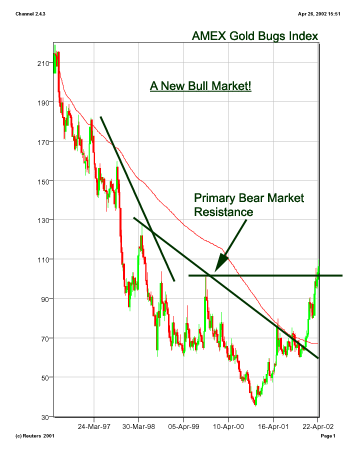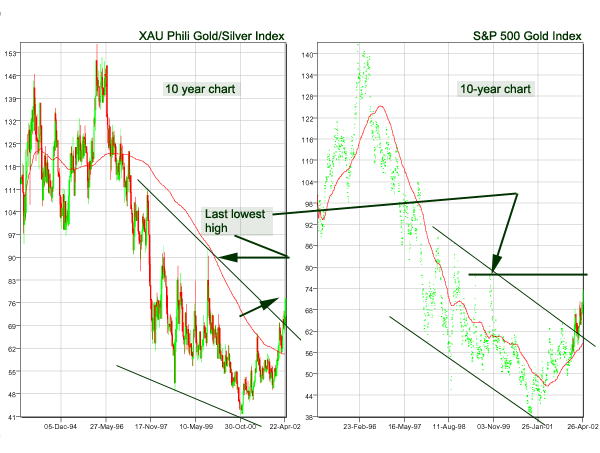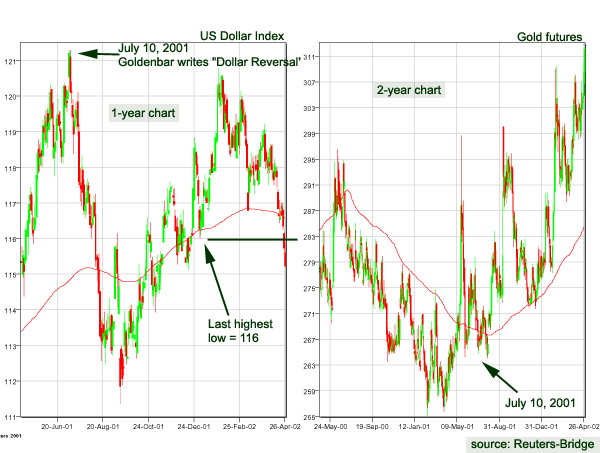28 April 2002
Printer Friendly Version
Technically, we can now say that the Amex
Gold Bugs Index has entered into a new primary bull market. We only need
the other indexes to confirm it.
A trend is defined by its sequence of lows and highs. As far as the five-year bear market in gold stocks was concerned, the annotated high made September 1999 in all of the gold shares represented the last lowest high in the primary bearish sequence. Technicians take the breakout through this level as a bullish sign, that at minimum, the primary bear market is over.
Still, while we're really bullish, and maybe getting a little ahead of ourselves, none of the other North American gold indexes have accomplished the same reversal of their respective primary bear markets. Though at this rate, this may be the last column in which we have to say that. For all of them are pretty darn close.
By the way, please note that these reversal points are precisely our targets for those indexes, as per our January comments. As such, the Amex Gold Bugs index has already raced through our target.

Over the past week, almost every gold stock on our screen made fresh highs, except for Goldcorp and Placer Dome. Gold prices made fresh 17-month highs after breaking out of a two month continuation pattern, rising $9 to close at the $312 mark, bringing the value of Australian gold hedges much closer to their break-even point where they turn into a liability. Their only saving grace so far is their new position in Australian currency hedges.
The Aussie dollar has been rising smartly since February, and has probably moved up the level at which these hedges break even by a couple of points. Nonetheless, the break out in gold is a resolution of one of last week's market crossroads; the other is the break down in the dollar index this week, or Wednesday / Thursday to be specific. There is no question to us that the two are in fact related. But according to at least one man they aren't.
I ran across a bullish gold article by Paul Erdman, a CBS MarketWatch columnist that calls himself an economist. Erdman has been a staunch dollar bull, in fact, perhaps one of CBS' most persistent dollar bulls. And his arguments are persistently lame.
Rah, rah, you know, that kind of stuff. Anyhow, in this article he found a way to get bullish on gold, but not bearish on the dollar. I thought it would be entertaining, but also, I have a point to make:
"(I suspect gold will rally, but) not for the usual reasons. The traditional gold bugs always based their wild forecasts on the pending end of the world as we know and love it. Included in almost all of the forecasts by these false prophets were runaway inflation and a collapse of the dollar, which would then trigger global currency chaos and lead, inexorably, to our return to a 19th century type of gold standard. That simply ain't going to happen. Inflation is under control. The dollar remains strong despite the ever- present huge trade deficit and remains, in fact, the only game in town when it comes to financing both international trade and global investment. And there isn't a central banker on the planet that wants to remonetize gold. But you need look no farther away than Argentina and France to see why gold still has its place in our financial system. It remains the ultimate hedge against the unknown catastrophe that might lie somewhere down the road" - CBS MarketWatch, 26 April 2002.
I just had to send him a nasty one liner email. All right, I was a little rough, but the world's journalist community needs to be shaken up, in my view. If they aren't busy reporting on the irrelevant past (this applies only to those journalists that comment on the markets), they are repeating clumsy government economic doctrine.
What does it mean, "inflation is under control?" Who is controlling it? I didn't think that anyone manipulates markets in mainstream's world.
The irony is that Gold usually goes up against the dollar (take note Paul) when "they" in fact do lose control over inflation. At such a point in an inflationist system, the dollar's purchasing power doesn't increase any longer, at the margin, and perhaps in the aggregate. Interest rates don't stay down when they're needed to, as bond holders are paid in increasingly abundant dollars too. Foreign nations depending on a rising valuation for the dollar (for trade advantage) become less interested in helping policy makers sweep the inflation under the carpet (into asset markets). Trade frictions arise. To that extent, an inflation breakdown is the consequence of declining confidence that policymakers can sustain the dollar's global purchasing power.
Argentina's problems surfaced as a consequence of their requirement to peg against the dollar. To keep the peso from devaluing the government needed to borrow more dollars for direct and indirect support of the exchange rate. This worked in Citibank's favor, but the rising debt and interest rates eventually crippled the Argentine economy. Obviously, the Argentine central bank didn't have inflation under control.
Again, to be clear, we can't talk about inflation scientifically unless we only apply the term to money, not prices. If you were confused through the above two paragraphs we recommend re-reading them thinking of inflation in only this way - inflation is too much money relative to how much is in demand. That simple fact could help more people understand how the process of inflation eventually distorts the economy's structure of capital (I would say it thins it out), and ultimately undermines its real profits. As long as the transfer of wealth (let's be candid) occurs in an environment of evenly dispersed, and rising, nominal wealth, nobody will be the wiser. Consider it a way in which policymakers buy your vote.
Yet, it is precisely this process (of inflation) that is itself responsible for the invariable loss of control over inflation. This was learned long ago, but obviously, it hasn't reached the so-called economists that write for a larger population than we do - that fact itself works in favor of the policymakers trying to "control" it (the inflation).
It must be hard for a country like Argentina to maintain monetary discipline when its partner, who manages the international reserve currency, doesn't. We could criticize the policies of Argentina and others as excessive, but not if we were criticizing them as governors of dollar policy we couldn't. The dollar enjoys benefits other currencies don't, which have much more to do with policy and trade than the soundness of the currency.
The Fed has one of the hardest working printing presses of the entire G7, but it has mastered an ability to manage investment and inflation expectations. There are few governments in the world as busy as this one is in "controlling" the inflation, and as a consequence, in creating shortages in commodity markets that will ultimately come back and bite their controlling carcasses in the behind.
The 20th century is bound to a tale of monetary exploitation. The world we know and love is something we're all still working towards. It wasn't yesterday's world. Moreover, the rise of gold is not going to herald the end of the world. It is a barometer of economic justice and it is a capitalistic process of healing such injustices as our monetary authorities frequently bestow upon the free market system, unwittingly or not. The only way to prevent a frequent devaluation in dollars against gold in the long term is to keep governments out of the market system altogether. And this includes the market system that determines the money, above all. The 20th century's monetary doctrine is effectively an interruption in the market process that otherwise determines the best money for the global economy.
When I say governments should stay out of markets, I'm not talking about regulation; I'm talking about non-neutral intervention.
The end of the inflation era is not the end of the world. It is the beginning of a brand new era. The so-called "prophets" will be right, but in most cases they are only free market economists warning of market rebellion after years of monetary abuse.
It will be the end of Erdman's era, but the world will be a better place for it someday. There won't be so much green cheese, so to speak.
Getting there may be scary because those who "control the inflation" today are the same people (they) that control the world's wealth. Their control over that wealth is dependent upon the ability to sustain the inflation agenda, which in turn is dependent on their ability to optimize the purchasing power of the dollar, and affect the market's judgment so it continues to be the global common medium of exchange. The scary part is in what policies these parties will prefer the government to pursue in order to protect their interests in the inflationist system.
It would also be scary that the economy would collapse those industries that grew around, and have come to profit from, the inflation. The less governments interfere with the markets, however, the faster the rising unemployment will stop. The alternative is to only extend the length of time that markets could heal the economy, and there is where the most amount of policy blunders lay. A vote for dollar supremacy is not a vote for free markets, at least not so long as it is a tool of the Fed's (something they'll wholeheartedly deny by the way).
As for what is behind the breakout in gold. It isn't Argentina, or France, or Japan for that matter. Those are all just parts of the puzzle. It's the dollar, stupid!
There can be no question of a relationship between gold and the dollar, and it cannot be coincidence that gold prices rise on days the dollar and stocks are down. Indeed, there is no question in my mind that rising gold prices are forecasting a break down in the US dollar, broadly, and in the primary sequence.

Primary bullish support for the dollar index now stands at between 108 and 111, and primary bear market resistance for gold prices stands at $328 to $338.
Both markets are headed in that direction now.
Good Luck,
Ed Bugos